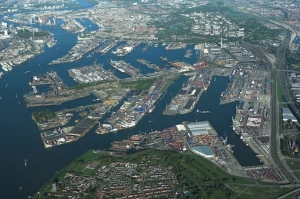


(Posted on 06/10/22)
The Port of Rotterdam Authority has developed four diverse global scenarios in detail to increase understanding of what the future might look like, so that the Port Authority can respond accordingly. What investments are needed to attract new freight flows, business and clean energy? Where should adjustments be made?
Central to these analyses was the issue of how changes in geopolitics, economics, society and technology would impact the port-industrial complex and the size and composition of the port's throughput. Will there be a global focus on ambitious climate action or will the energy transition stall? Will power blocks erect trade barriers to protect their own industries or will free trade be allowed to flourish? Do consumers prefer quality over price or the exact opposite?
The four scenarios towards 2050 and their corresponding concise story lines are:
Connected Deep Green: Effective global cooperation with acceleration on digital transparency in logistics chains and global commitment to targets to combat climate change, resulting in global carbon neutrality by 2050, broad prosperity and high economic growth and a maximum temperature rise of 1.5 degrees Celcius this century.
Regional Well-Being: From a shared commitment to transition, in the absence of sufficient global trust, a tilt towards a regional focus on clean and healthy environments, privacy and well-being emerges within clusters of countries by early 2030. This results in a deteriorating business environment for basic industry in Northwestern Europe and moderate economic growth.
Protective Markets: A world with distrust between power blocks, global geopolitical tensions and suboptimal integration in logistics chains. There are competing economic interests in a fragmented world with focus on self-sufficiency, financial prosperity, resilience and defence. No global carbon neutrality before 2100 and low economic growth.
Wake-Up Call: Increasing concerns about the economic impact of external shocks such as food and energy availability or extreme weather mark a turning point. There is growing awareness that strategic cooperation and rigorous measures are needed to reduce carbon emissions. This results in strategically strong EU policies, moderate economic growth and late but rapid transition to renewable energy.
The impact of each scenario has on throughput in the port of Rotterdam is summarised in the infographic below:
Allard Castelein, CEO of Port of Rotterdam Authority: "These latest estimates show that our portfolio will radically change in the next 30 years. The global scenarios help us to strengthen the position of the port-industrial complex in a targeted manner by focusing on sufficient production and processing capacity, good connectivity with key hinterland markets and accelerating sustainability."
The New Lock in Terneuzen has been operational since 1 August 2025 and a new phase has now begun: On... Read more
Two modern warehouses belonging to Solid Port, one of the key operators in the Inner Port, have been... Read more
With this year’s Rail Conference “Rail Freight Transport and Seaports”, a joint initiative... Read more
Asian Bulk Logistics (ABL Group) and ICG have jointly announced the successful completion of ABL&rsquo... Read more
Abu Dhabi based AD Ports Group, a leading global enabler of integrated trade, industry and logistics... Read more
The Executive Board of Hamburger Hafen und Logistik AG (HHLA) has appointed Patrick Krawutschke as Managing... Read more
Abu Dhabi based AD Ports Group, a global enabler of integrated trade, transport, industry, and logistics... Read more
This year marks a significant milestone in maritime innovation as Port Hedland, Australia, celebrates... Read more
Associated British Ports (ABP), the UK’s leading port operator, has announced the latest tranche... Read more
During the Investment, Labour, and Trade Promotion Programme in Japan (November 16–22, 2025),... Read more